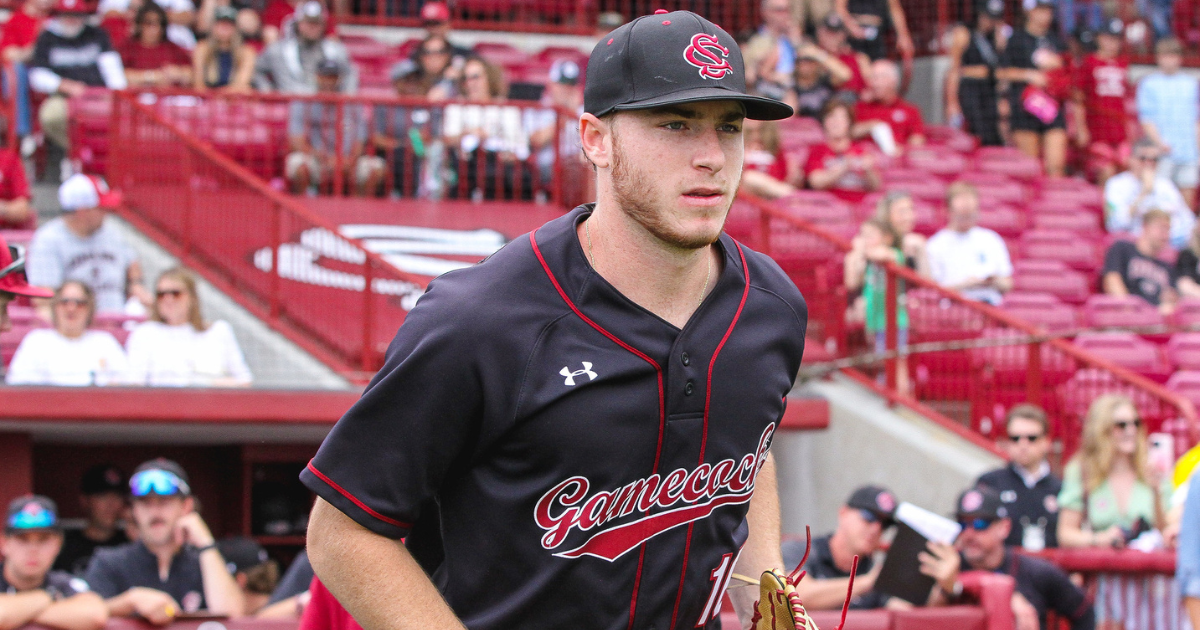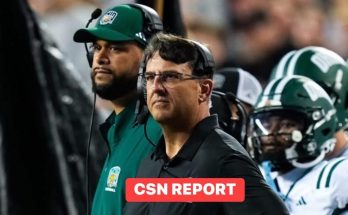South Carolina’s Dylan Eskew Out of Series Finale Against Arkansas: A Tough Blow for the Gamecocks
As the South Carolina Gamecocks prepared for the finale of their highly anticipated series against the Arkansas Razorbacks, a cloud of uncertainty loomed over the team. South Carolina’s star pitcher, Dylan Eskew, was suddenly ruled out for the decisive third game of the series due to an undisclosed injury. The announcement, made just hours before the game, sent shockwaves through the Gamecock fanbase and raised questions about how the team would respond in his absence. Eskew, who had been one of the key players all season, was not just another pitcher—he was the anchor of the Gamecocks’ pitching staff, providing leadership and consistency on the mound.
This unexpected setback forced South Carolina’s coaching staff to adjust their game plan quickly. The Gamecocks, who had already faced the challenges of playing against a high-powered Arkansas team, now found themselves in a situation where they needed to step up in ways they hadn’t anticipated. With the stakes high and the series on the line, the Gamecocks were forced to dig deep and lean on their depth, resilience, and collective will to finish the season strong.
The Importance of Dylan Eskew to South Carolina’s Success
Dylan Eskew had been nothing short of exceptional for South Carolina all season. As a starting pitcher, Eskew had quickly established himself as one of the top performers in the SEC, earning respect for his poise, control, and ability to handle pressure situations. Over the course of the season, he had consistently delivered for the Gamecocks, becoming one of the most reliable arms on the team. Eskew’s presence on the mound had been a constant for the Gamecocks, and his performances were integral to their success throughout the season.
Heading into the series against Arkansas, Eskew was set to start in the finale, which made the timing of his injury all the more unfortunate. Arkansas, a powerhouse in the SEC, was a formidable opponent with one of the most potent offenses in the country. The Gamecocks had already dropped the first game of the series and knew that they would need a strong performance from Eskew in the final game to avoid a series sweep and to maintain their momentum in the postseason race.
For head coach Mark Kingston and his staff, Eskew’s absence forced them to re-evaluate their pitching strategy. With the pressure mounting and the Gamecocks needing a win to salvage the series, there was little margin for error. Eskew’s injury was not just a blow to the team’s pitching rotation; it was a psychological blow as well, as the Gamecocks had relied on him to lead them through challenging matchups. His leadership and experience were invaluable assets, and his absence created a sense of uncertainty.
The Challenge of Replacing Eskew
In the wake of Eskew’s injury, the Gamecocks had to quickly shift gears and adapt to the new reality of the series finale. The team’s pitching staff, while talented, had not been tested in the same way as Eskew throughout the season. The Gamecocks would need someone to step up in the absence of their ace.
Coach Kingston and pitching coach Skylar Meade quickly turned to sophomore pitcher Will McGillis, a talented right-hander who had been a consistent contributor out of the bullpen but had not yet taken on the same starting role that Eskew had. McGillis, who had shown flashes of brilliance during the season, was now thrust into the spotlight with the task of keeping South Carolina in the game against one of the most dangerous offenses in the SEC.
McGillis, however, was no stranger to pressure. He had pitched in several key situations during the season and had proven himself capable of handling the big moments. But starting a game, particularly in the SEC, was a different challenge entirely. The Gamecocks would need McGillis to deliver a strong outing, keeping Arkansas’ offense in check and giving South Carolina’s hitters a chance to find their rhythm at the plate.
In addition to McGillis, the Gamecocks had several other pitchers who would be called upon to contribute. The bullpen, led by closer Chris Veach, had been solid throughout the season, but the absence of Eskew meant that the Gamecocks’ pitchers would need to work together as a unit, with each member stepping up when needed. This collective effort would be crucial, as one mistake could be the difference between victory and defeat.
The Series Against Arkansas: A Tough Opponent
Arkansas had come into the series as one of the top teams in the country, with a lineup that boasted several powerful hitters and a pitching staff that was equally formidable. The Razorbacks had been ranked among the top five teams in the nation, and their reputation as a national powerhouse was well-earned. With a strong mix of veterans and young talent, Arkansas was one of the most complete teams in the country.
In the opening game of the series, Arkansas demonstrated their offensive firepower, scoring early and often against the Gamecocks. South Carolina had fought back valiantly, but they ultimately fell short, dropping the game by a 9-6 margin. The loss left them in a precarious position, knowing that they needed to win the second game of the series to keep their hopes alive for a series split.
In the second game, the Gamecocks showed resilience and determination, bouncing back with a 5-3 victory. The pitching staff, led by starting pitcher Julian Bosnic, put together a solid performance, and South Carolina’s offense came alive in the middle innings to secure the win. The Gamecocks had managed to stay in the hunt, but now, with Eskew sidelined for the finale, they were tasked with taking on Arkansas once more, this time with even more pressure on their shoulders.
The Absence of Eskew: Psychological and Strategic Impact
The loss of Eskew for the series finale had both a psychological and strategic impact on the Gamecocks. On the psychological side, Eskew had been a leader in the clubhouse. His presence on the mound was something the team could always rely on, and his absence forced other players to step up not only in terms of performance but also in terms of leadership.
In the days leading up to the series finale, Coach Kingston had emphasized the need for a collective effort from his team. While Eskew’s leadership on the mound was irreplaceable, the Gamecocks needed to stay focused and execute as a team. His injury required the rest of the squad to adjust mentally, knowing that they had to work together to overcome the challenge ahead.
Strategically, the loss of Eskew meant that South Carolina had to shift their approach to pitching. McGillis, though talented, was not an automatic replacement for Eskew’s experience and reliability. The Gamecocks would have to rely on their bullpen more heavily than usual, hoping to match Arkansas’ offensive firepower with a combination of strong pitching and timely hitting. It was a daunting task, but it was one that the Gamecocks were ready to face.
The Gamecocks’ Response: A Battle to the Finish
Despite the challenging circumstances, the Gamecocks responded with determination in the series finale. McGillis, making his first career start in the SEC, took the mound with a mix of nerves and confidence. He knew that his performance would be crucial to the team’s success, and he gave it everything he had. Through five innings, McGillis kept Arkansas at bay, surrendering just two earned runs while striking out five. His composure in the face of adversity was a testament to his maturity as a pitcher, and he gave the Gamecocks a fighting chance.
However, Arkansas’ offense proved to be too much in the later innings. As the Razorbacks began to put together a string of hits, South Carolina’s bullpen struggled to maintain control. The Gamecocks kept battling, but Arkansas’ depth and power eventually wore them down. The Razorbacks’ offense exploded in the seventh inning, scoring three runs to take a commanding 7-4 lead.
South Carolina fought back in the eighth inning, narrowing the deficit to 7-6, but they were unable to push across the tying run. In the end, Arkansas held on for the 7-6 win, securing the series victory. The Gamecocks, though disappointed by the loss, could hold their heads high for their effort, especially in light of the challenges they faced without Eskew.
Looking Ahead: The Road to Recovery
For the Gamecocks, the loss was a tough pill to swallow, but it did not define their season. The absence of Dylan Eskew for the series finale was a difficult setback, but South Carolina showed resilience in the face of adversity. The team will now look ahead, regrouping and focusing on the upcoming challenges as they prepare for the final stretch of the regular season and the postseason.
As for Eskew, the hope is that his injury is not a long-term concern and that he will be able to return to action soon. His leadership and pitching abilities will be invaluable for the Gamecocks as they aim to make a deep run in the postseason. For now, the Gamecocks will continue to lean on their depth and the collective spirit of the team as they work to finish the season strong.
While the series finale against Arkansas was a disappointing loss, the Gamecocks’ fight and determination were evident throughout the game. With their eyes set on the bigger picture, the Gamecocks will push forward, knowing that they have the talent and the heart to overcome whatever obstacles lie ahead.



